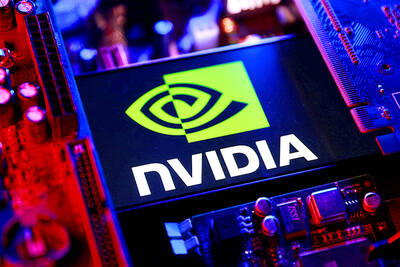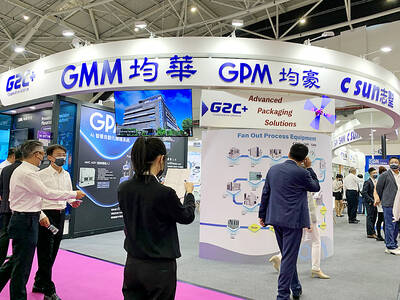Taiwan Semiconductor Manufacturing Co (TSMC, 台積電) suspended shipments to China-based chip designer Sophgo Technologies Ltd (算能科技) after a chip it made was found on a Huawei Technologies Co (華為) artificial intelligence (AI) processor, according to two people familiar with the matter.
Sophgo had ordered chips from TSMC that matched the one found on Huawei’s Ascend 910B, the people said. Huawei is restricted from buying the technology to protect US national security. Reuters could not determine how the chip ended up on the Huawei product.
Sophgo said in a statement on its Web site yesterday that it was in compliance with all laws and had never engaged in any business relationship with Huawei. Sophgo, which is affiliated with cryptocurrency mining equipment company Bitmain Technologies Ltd (比特大陸), said it had provided a detailed investigation report to TSMC to prove that it was not related to Huawei.

Photo: CNA
TSMC declined to comment. Huawei did not immediately respond to a request for comment. The US Department of Commerce said it was aware of reports of potential violations of US export controls but it could not comment on whether any investigation was ongoing.
Tech research firm TechInsights discovered the TSMC chip on Huawei’s Ascend 910B when it took apart the multi-chip processor, a different source told Reuters on Tuesday last week.
After being alerted to the finding, TSMC notified the US about two weeks ago, the source said.
About the same time, TSMC also halted shipments to a client, Reuters reported on Wednesday, citing a Taiwanese official who said the suspension came after the company discovered a chip it supplied to the client ended up in a Huawei product.
TSMC alerted Taiwanese and US authorities, and began a detailed investigation, the official said. However, the official did not name the client, which the latest sources identified as Sophgo. The Information tech news outlet also reported the name on Saturday.
In August, the Research Institute for Democracy, Society and Emergency Technology (DSET) in Taiwan reported that Bitmain, which it described as a leading Chinese integrated circuit design enterprise and supplier of cryptocurrency mining machines, was “aiming to challenge the AI chip market dominance of Nvidia Corp and Advanced Micro Devices Inc.”
The DSET report described Sophgo as a Bitmain affiliate. Sophgo was co-founded by Micree Zhan (詹克團), who also co-founded Bitmain, according to a corporate registration database.
The company also communicated with the US Federal Communications Commission last year using a Bitmain email address and the name Xiamen Sophgo Technologies Ltd.
In 2021, prosecutors raided Bitmain’s operations in Taiwan and accused two Bitmain affiliates of illegally recruiting Taiwanese semiconductor engineers and illegally conducting research and development activities, the New Taipei City Prosecutors’ Office said in a statement.
Four Taiwanese defendants pleaded guilty and were given fines, it said.
Sophgo’s Web site says it has research and development centers in more than 10 cities in China and other countries.

POWERING UP: PSUs for AI servers made up about 50% of Delta’s total server PSU revenue during the first three quarters of last year, the company said Power supply and electronic components maker Delta Electronics Inc (台達電) reported record-high revenue of NT$161.61 billion (US$5.11 billion) for last quarter and said it remains positive about this quarter. Last quarter’s figure was up 7.6 percent from the previous quarter and 41.51 percent higher than a year earlier, and largely in line with Yuanta Securities Investment Consulting Co’s (元大投顧) forecast of NT$160 billion. Delta’s annual revenue last year rose 31.76 percent year-on-year to NT$554.89 billion, also a record high for the company. Its strong performance reflected continued demand for high-performance power solutions and advanced liquid-cooling products used in artificial intelligence (AI) data centers,

SIZE MATTERS: TSMC started phasing out 8-inch wafer production last year, while Samsung is more aggressively retiring 8-inch capacity, TrendForce said Chipmakers are expected to raise prices of 8-inch wafers by up to 20 percent this year on concern over supply constraints as major contract chipmakers Taiwan Semiconductor Manufacturing Co (TSMC, 台積電) and Samsung Electronics Co gradually retire less advanced wafer capacity, TrendForce Corp (集邦科技) said yesterday. It is the first significant across-the-board price hike since a global semiconductor correction in 2023, the Taipei-based market researcher said in a report. Global 8-inch wafer capacity slid 0.3 percent year-on-year last year, although 8-inch wafer prices still hovered at relatively stable levels throughout the year, TrendForce said. The downward trend is expected to continue this year,

‘BASICALLY A BAN’: Sources said the wording governing H200 imports from officials was severe, but added that the regulations might change if the situation evolves Chinese customs authorities told customs agents this week that Nvidia Corp’s H200 artificial intelligence (AI) chips are not permitted to enter China, three people briefed on the matter said. Chinese government officials also summoned domestic technology companies to meetings on Tuesday, at which they were explicitly instructed not to purchase the chips unless necessary, two of the people and a third source said. “The wording from the officials is so severe that it is basically a ban for now, though this might change in the future should things evolve,” one of the people said. The H200, Nvidia’s second-most powerful AI chip, is one

STRONG SALES: The company said that revenue growth momentum would remain strong this year and next year as major customers continue to buy new equipment Semiconductor equipment supplier Gallant Precision Machining Co (均豪) yesterday reported its best annual profit in 19 years last year, as booming artificial intelligence (AI) chip demand boosted sales of its advanced packaging equipment. Net profit surged about 40 percent to NT$415 million (US$13.12 million), compared with NT$297 million in 2024, the company said in a regulatory filing. Earnings per share rose to NT$2.58 from NT$1.82. Revenue grew 5.18 percent annually to NT$4.67 billion from NT$4.44 billion in 2024. Gallant Precision said revenue growth momentum would remain strong this year and next year as major customers continue to spend heavily on new equipment to boost